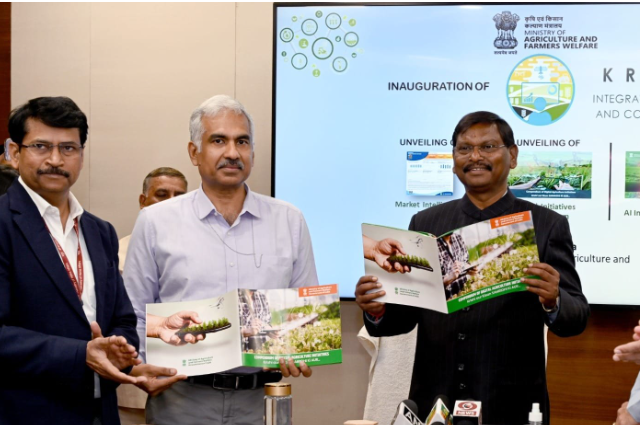Recently, our Agriculture Minister inaugurated a Krishi Integrated Command and Control Centre (ICCC) set up at Krishi Bhavan in New Delhi, a big centre of all digital innovations in the field of agriculture. Officials consider that the ICCC is a 'significant leap forward' in extending technological reforms to the agricultural sector.
What is the Krishi ICCC?
- The ICCC is a technology-based solution which covers different applications and software. The Centre largely governs the Ministry of Agriculture and Farmers Welfare which is responsible for legislation, policy formation and adoption of different initiatives in an attempt to improve the agricultural sector.
- The ICCC uses different technologies such as AI, remote sensing and Geographic Information (GSI) to both store, process and analyse heavy data. This shall help in the prediction of temperatures, rainfall, wind speed, crop yields and production estimates.
55-inch LED screens show you data on the produce, situations of natural calamities, and cropping patterns covering different geographical regions in different maps and timelines.
Key Performance Indicators (KPIs) and some outliers are also provided as an extension. To this. It gives new insights, alerts and feedback on different agricultural programmes. The ICCC uses platforms including the Krishi Decision Support System (DSS) to collect micro data and process it to help in the generalization of facts.
It also has a contact centre and helpdesk facility which has the potential of becoming a call centre too. Farmers can definitely interact with officials or the Minister through video conferencing facilities.
The availability of data shall enable quick decision making and that can be linked with the PM-Kisan Chatbot.
The ICCC will enable comprehensive monitoring of the farm by collating geospatial data from various sources including soil surveys and weather data. The sowing and the harvesting periods etc and things coming from Digital Crop Directly. They shall also collaborate with the India Meteorological Department (IMD). Krishi MApper, an application for geo-tagging of land, market intelligence information from the Unified Portal for Agriculture Statistics (UPAg) and yield estimates of grains from the General Crop Estimation Survey.
Visualisation of data and an efficient decision-making system shall help the ICCC ecosystem move forward. It can also create farmer-level advisories and that can be generated through apps like Kisan e-Mitra.
The AI machine will identify a farmer through his or her Aadhar and match it with the farmer's field information through the land records and accordingly it shall issue a customised advisory that too in the local language of the farmer and that service will be extended by Bhashini platform.
ICCC also allowed visualisation of carbon mapping as well as soil health for a particular place. Accordingly, an advisory is issued to the farmers about the type of crops that can be grown and water and fertilizer requirements.
According to officials, an increase or decrease in yield from a specific region can be attributed to weather, rainfall and other information that's collected from the Drought Portal enabling the administration with regard to the produce from an area along with productive solutions for agricultural diversification.
. . .
References:
- indianexpress.com
- economictimes.com
- https://nammakspc.com

